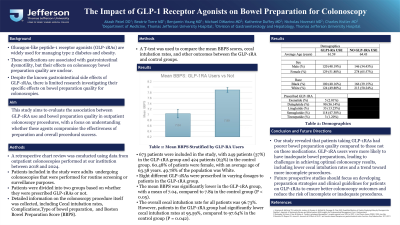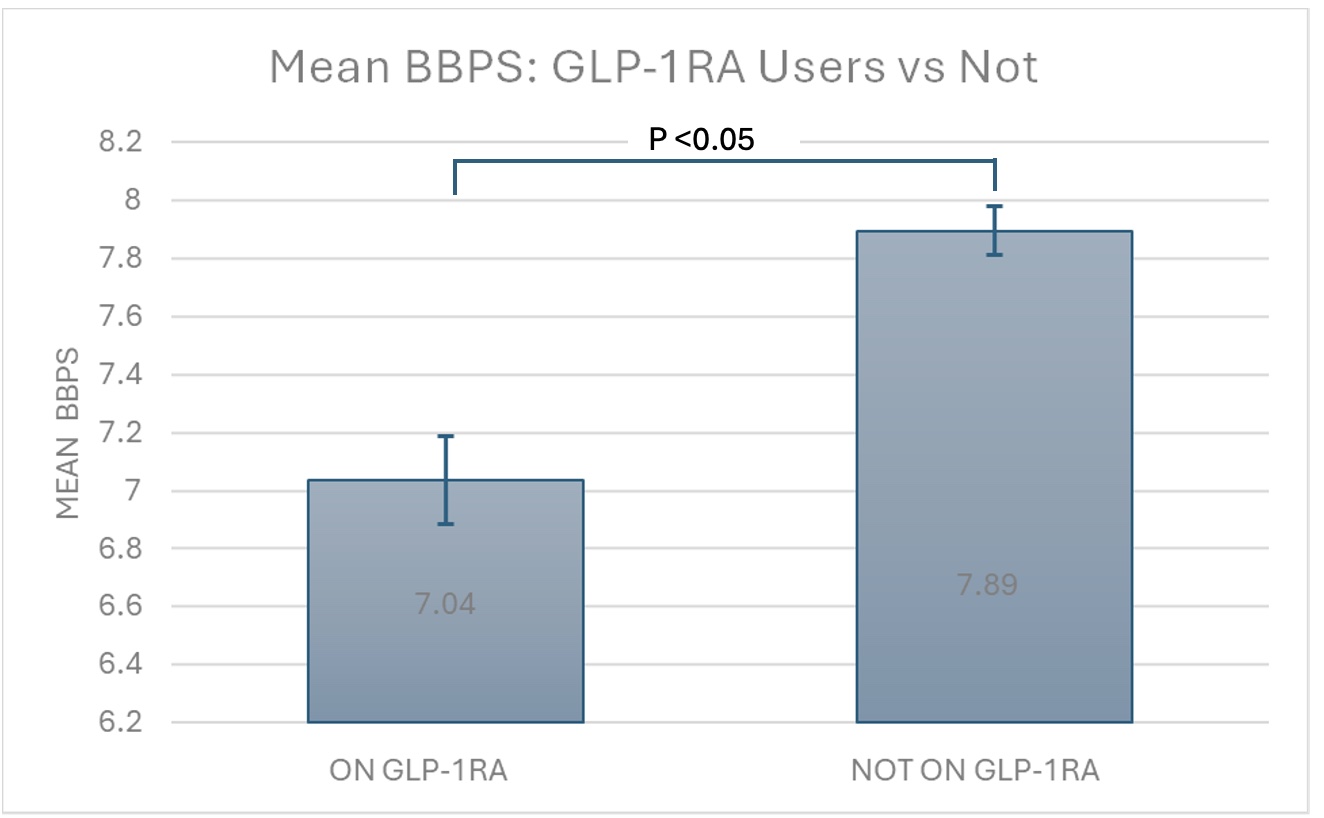Sunday Poster Session
Category: General Endoscopy
P0680 - The Impact of GLP-1 Receptor Agonists on Bowel Preparation for Colonoscopy
Sunday, October 27, 2024
3:30 PM - 7:00 PM ET
Location: Exhibit Hall E

Has Audio
.jpg)
Akash Patel, DO
Thomas Jefferson University Hospital
Philadelphia, PA
Presenting Author(s)
Award: Presidential Poster Award
Akash Patel, DO1, Beatriz Torre, MD2, Benjamin Young, MD1, Michael J. DiMarino, MD3, Katherine Duffey, MD2, Nicholas Noverati, MD1, Charles Kistler, MD3
1Thomas Jefferson University Hospital, Philadelphia, PA; 2Thomas Jefferson University, Philadelphia, PA; 3Sidney Kimmel Medical College at Thomas Jefferson University, Philadelphia, PA
Introduction: Glucagon-like peptide-1 receptor agonists (GLP-1RAs), effective for type 2 diabetes and obesity, are rising in popularity. . While their effect on gastrointestinal motility has been well researched, their impact on colonoscopy bowel preparations is unclear. This study evaluates the effects of GLP-1RAs on bowel preparation quality in outpatient colonoscopies.
Methods: We conducted a retrospective chart review of patients undergoing outpatient colonoscopies at our institution between 2018-2024. Patients were divided into two groups: those prescribed GLP-1RAs and those not. Adults over 18 undergoing nonemergent colonoscopies, primarily for screening and surveillance, were included in the study. Data collected included details of prescribed GLP-1RAs including dose and start date relative to the procedure, patient demographics, and procedure details including cecal intubation rates, complications, type of bowel preparation, and Boston Bowel Preparation Score (BBPS). Statistical analysis was done using T-test.
Results: Of the 673 patients included in our study, 249 (37%) were prescribed GLP-1RAs and 424 (63%) were not. 407 (60.48%) were female and the average age was 63.38 years, and 335 (49.78%) were white. Eight different GLP-1RAs were prescribed with varying dosages. The mean BBPS among patients prescribed GLP-1RAs was significantly lower than those not on GLP-1RAs (7.04 vs 7.89, P =< 0.05). Those on GLP1-RAs had higher rates of inadequate preparations (BBPS < 6) compared to those not taking them (8.84% vs 3.07%, p < 0.05). Overall cecal intubation rate was 96.73%. Cecal intubation rates were significantly lower in patients on GLP-1RAs compared to those not on GLP-1RAs (95.59% vs 97.64%, P = 0.042). However, the rates of incomplete colonoscopies did not differ significantly between the groups (2.81% vs 1.65%, P = 0.155).
Discussion: Patients prescribed GLP-1RAs were found to have a lower mean BBPS, lower cecal intubation rates, and higher rates of incomplete colonoscopies compared to patients who were not prescribed these agents. Patients prescribed GLP-1RAs may require adjusted bowel preparation protocols to appropriately prepare for screening and surveillance colonoscopies. Further research should focus on prospective studies to evaluate protocols and preparation regimens to establish guidelines in this population to ensure high-quality colonoscopy preparation.

Note: The table for this abstract can be viewed in the ePoster Gallery section of the ACG 2024 ePoster Site or in The American Journal of Gastroenterology's abstract supplement issue, both of which will be available starting October 27, 2024.
Disclosures:
Akash Patel, DO1, Beatriz Torre, MD2, Benjamin Young, MD1, Michael J. DiMarino, MD3, Katherine Duffey, MD2, Nicholas Noverati, MD1, Charles Kistler, MD3. P0680 - The Impact of GLP-1 Receptor Agonists on Bowel Preparation for Colonoscopy, ACG 2024 Annual Scientific Meeting Abstracts. Philadelphia, PA: American College of Gastroenterology.
Akash Patel, DO1, Beatriz Torre, MD2, Benjamin Young, MD1, Michael J. DiMarino, MD3, Katherine Duffey, MD2, Nicholas Noverati, MD1, Charles Kistler, MD3
1Thomas Jefferson University Hospital, Philadelphia, PA; 2Thomas Jefferson University, Philadelphia, PA; 3Sidney Kimmel Medical College at Thomas Jefferson University, Philadelphia, PA
Introduction: Glucagon-like peptide-1 receptor agonists (GLP-1RAs), effective for type 2 diabetes and obesity, are rising in popularity. . While their effect on gastrointestinal motility has been well researched, their impact on colonoscopy bowel preparations is unclear. This study evaluates the effects of GLP-1RAs on bowel preparation quality in outpatient colonoscopies.
Methods: We conducted a retrospective chart review of patients undergoing outpatient colonoscopies at our institution between 2018-2024. Patients were divided into two groups: those prescribed GLP-1RAs and those not. Adults over 18 undergoing nonemergent colonoscopies, primarily for screening and surveillance, were included in the study. Data collected included details of prescribed GLP-1RAs including dose and start date relative to the procedure, patient demographics, and procedure details including cecal intubation rates, complications, type of bowel preparation, and Boston Bowel Preparation Score (BBPS). Statistical analysis was done using T-test.
Results: Of the 673 patients included in our study, 249 (37%) were prescribed GLP-1RAs and 424 (63%) were not. 407 (60.48%) were female and the average age was 63.38 years, and 335 (49.78%) were white. Eight different GLP-1RAs were prescribed with varying dosages. The mean BBPS among patients prescribed GLP-1RAs was significantly lower than those not on GLP-1RAs (7.04 vs 7.89, P =< 0.05). Those on GLP1-RAs had higher rates of inadequate preparations (BBPS < 6) compared to those not taking them (8.84% vs 3.07%, p < 0.05). Overall cecal intubation rate was 96.73%. Cecal intubation rates were significantly lower in patients on GLP-1RAs compared to those not on GLP-1RAs (95.59% vs 97.64%, P = 0.042). However, the rates of incomplete colonoscopies did not differ significantly between the groups (2.81% vs 1.65%, P = 0.155).
Discussion: Patients prescribed GLP-1RAs were found to have a lower mean BBPS, lower cecal intubation rates, and higher rates of incomplete colonoscopies compared to patients who were not prescribed these agents. Patients prescribed GLP-1RAs may require adjusted bowel preparation protocols to appropriately prepare for screening and surveillance colonoscopies. Further research should focus on prospective studies to evaluate protocols and preparation regimens to establish guidelines in this population to ensure high-quality colonoscopy preparation.

Figure: Mean BBPS between groups
Note: The table for this abstract can be viewed in the ePoster Gallery section of the ACG 2024 ePoster Site or in The American Journal of Gastroenterology's abstract supplement issue, both of which will be available starting October 27, 2024.
Disclosures:
Akash Patel indicated no relevant financial relationships.
Beatriz Torre indicated no relevant financial relationships.
Benjamin Young indicated no relevant financial relationships.
Michael DiMarino indicated no relevant financial relationships.
Katherine Duffey indicated no relevant financial relationships.
Nicholas Noverati indicated no relevant financial relationships.
Charles Kistler indicated no relevant financial relationships.
Akash Patel, DO1, Beatriz Torre, MD2, Benjamin Young, MD1, Michael J. DiMarino, MD3, Katherine Duffey, MD2, Nicholas Noverati, MD1, Charles Kistler, MD3. P0680 - The Impact of GLP-1 Receptor Agonists on Bowel Preparation for Colonoscopy, ACG 2024 Annual Scientific Meeting Abstracts. Philadelphia, PA: American College of Gastroenterology.

